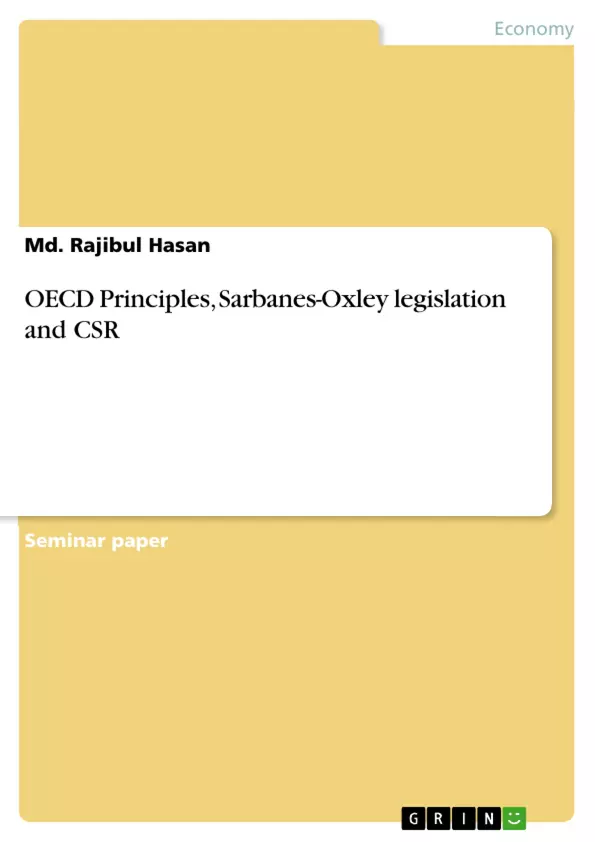In recent years, Corporate Social Responsibility (CSR) and Corporate Governance has been widely explored with a number of reports and codes of practice aimed at decreasing instances of what are seen as grossly unethical ways of managing major organizations. Quite apart from the strictures of moral theory, there is considerable danger to the reputation of quoted companies if shareholders feel that they do not believe the information presented to them by company directors and senior executives. Any general lack of confidence in the financial probity of companies could be very damaging to the economic system as a whole. If entrepreneurs and senior managers want unjustified large salary instead of paying attention to the wishes of shareholders, then conflict happened (Harrison, 2005). Thus, the developments of the Corporate Governance Codes like Cadbury Report, OECD principles, Sarbanes-Oxley Act etc have been driven by financial scandal, corporate collapse, or similar crisis. CSR has developed the idea of corporate governance in order to encourage management to take broader ethical considerations into their account. The introduction of corporate governance codes has been motivated by a desire for more transparency and accountability, and a desire to increase investor’s confidence in the stock market as a whole (Mallin, 2007). This essay presents a critical discussion of the OECD Principles and the Sarbanes-Oxley Act for corporate governance within the context of high profile businesses. Later, it will present the significant differences in focus and intend between OECD and Sarbanes-Oxley. Moreover, it will critically discuss the convergence of Corporate Governance and Corporate Social Responsibility (CSR).
Inhaltsverzeichnis (Table of Contents)
- Introduction
- Corporate Governance
- The OECD Principles of corporate governance
- The Sarbanes-Oxley Act of corporate governance
- Discussion and evaluation of the OECD Principles and the Sarbanes-Oxley Act within the context of high-profile businesses
- The significant Differences in focus and intend between OECD and Sarbanes-Oxley
- Cadbury report
- Greenbury Report
- Corporate Social Responsibility(CSR)
- The convergence of corporate governance and corporate social responsibility
- Conclusion
Zielsetzung und Themenschwerpunkte (Objectives and Key Themes)
This essay provides a critical discussion of the OECD Principles and the Sarbanes-Oxley Act for corporate governance within the context of high-profile businesses. It analyzes the significant differences in focus and intent between these two frameworks, while also exploring the convergence of Corporate Governance and Corporate Social Responsibility (CSR).- Corporate governance and its role in promoting ethical behavior and preventing financial scandals.
- Analysis of the OECD Principles of corporate governance, including their strengths, weaknesses, and impact on businesses.
- Examination of the Sarbanes-Oxley Act, focusing on its provisions, effectiveness, and influence on corporate conduct.
- Comparison and contrast of the OECD Principles and Sarbanes-Oxley Act, highlighting their differences in focus and intent.
- The convergence of Corporate Governance and Corporate Social Responsibility (CSR), exploring their interconnectedness and the evolving landscape of ethical business practices.
Zusammenfassung der Kapitel (Chapter Summaries)
- Introduction: This chapter establishes the context for the essay by highlighting the increasing importance of Corporate Social Responsibility (CSR) and Corporate Governance in addressing unethical business practices. It emphasizes the potential risks to corporate reputation and the economic system as a whole if shareholders lack confidence in financial reporting.
- Corporate Governance: This chapter provides a definition of corporate governance, drawing from various sources including Shleifer and Vishny (1997), the Organization for Economic Co-operation and Development (OECD), and Sir Adrian Cadbury (1999). It emphasizes the role of corporate governance in balancing social and economic goals and aligning the interests of corporations, individuals, and society.
- The OECD Principles of corporate governance: This chapter delves into the OECD Principles of corporate governance, published in 1999 and revised in 2004. It outlines the principles' non-binding nature, their role as a reference for national legislation and regulation, and their impact on stock exchanges, investors, corporations, and other stakeholders. The chapter highlights the revised principles' emphasis on investor rights, shareholder engagement, and transparency in corporate decision-making.
- The Sarbanes-Oxley Act of corporate governance: This chapter focuses on the Sarbanes-Oxley Act, a piece of legislation designed to regulate corporate conduct and promote ethical behavior. It highlights the act's impact on the public accounting profession, particularly the requirement for CEOs and CFOs to certify the accuracy of financial reports.
Schlüsselwörter (Keywords)
This essay focuses on the intersection of Corporate Governance, Corporate Social Responsibility (CSR), and ethical business practices. Key concepts include OECD Principles, Sarbanes-Oxley Act, stakeholder engagement, transparency, accountability, financial reporting, ethical decision-making, and corporate reputation.Frequently Asked Questions
What is the main goal of Corporate Governance codes?
The primary goals are to increase transparency and accountability, prevent financial scandals, and restore investor confidence in the stock market.
What are the OECD Principles of Corporate Governance?
The OECD Principles are non-binding guidelines that serve as a global reference for national legislation to improve corporate accountability and shareholder rights.
How does the Sarbanes-Oxley Act (SOX) differ from OECD principles?
While OECD principles are guidelines, SOX is a mandatory piece of US legislation that requires executives to personally certify the accuracy of financial reports.
What is the relationship between Corporate Governance and CSR?
There is a growing convergence where corporate governance provides the framework for management to take broader ethical and social responsibilities (CSR) into account.
Why did financial scandals drive the development of these codes?
High-profile corporate collapses showed that unethical management and lack of transparency could damage the entire economic system, necessitating stricter rules.
What role do CEOs and CFOs play under the Sarbanes-Oxley Act?
They are legally required to certify financial statements, making them directly accountable for any fraudulent reporting or inaccuracies.
- Citar trabajo
- PhD Candidate, MBA, BBA Md. Rajibul Hasan (Autor), 2011, OECD Principles, Sarbanes-Oxley legislation and CSR, Múnich, GRIN Verlag, https://www.grin.com/document/208274



